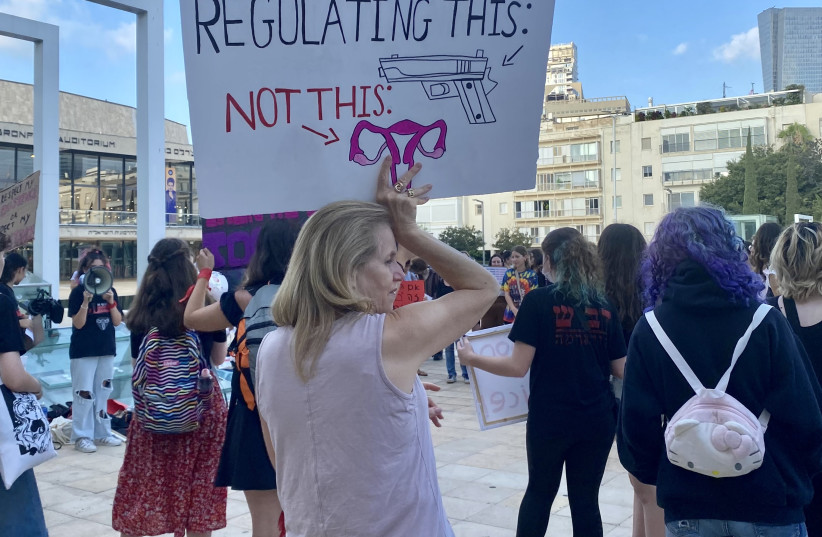Some 100 people gathered in Habima Square in Tel Aviv on Tuesday evening in a show of solidarity with women in the United States and to protest the overturning of Roe v. Wade by the US Supreme Court last Friday.
Organized by Lada’at, one of Israel’s largest pro-choice organizations, in association with SlutWalk Jerusalem and the Lotem Counter Gender-Terrorism Unit, the protest was described as a way to demonstrate against the decision from afar while showing support and standing in solidarity with those affected by the ruling.
Chants of “Pro-life that’s a lie, you don’t care if women die,” filled the square as crowds gathered, many holding signs expressing anger and disgust at the Supreme Court’s decision.
Attending the protest with a group of American-Israelis from Ma’aleh Hahamisha was 64-year-old Deborah, who said she remembered the moment the historic Roe v. Wade ruling was passed in 1973.
What did the women say?

“I was 14 years old in 1973,” she told The Jerusalem Post. “I kind of remember the whole women’s movement, and I grew up in America very proud of that period in history. I myself volunteered at a reproductive health clinic for 10 years. Something like this is a big blow.”
Caitlin, an American citizen, said ever since the initial draft of the Supreme Court’s decision was leaked in May, she had been anxious and dreading this moment.
“I can’t do much,” she said. “So I’m here and I’m yelling. Women, people with uteruses, deserve the right to choose what to do with their own bodies.”
“I can’t do much. So I’m here and I’m yelling. Women, people with uteruses, deserve the right to choose what to do with their own bodies.”
Caitlin at the protest against the overturning of Roe v. Wade in Tel Aviv
Holding a sign that said, “Women just want to have fundamental human rights,” eighth-grader Rut told the Post she decided to attend the protest for more than one reason.
“I’m really young, and I already have friends who have gone through incredibly hard things,” she said. “I think it’s incredibly important that we have rights over our own bodies.”
With family and friends in Texas, one of the states where abortion will be banned without exception, even in instances of rape or incest, the issue is close to Rut’s heart.
“I spent three years in the US,” she said. “I go there every summer. It’s extremely important to me to be here today.”
Unlike Deborah, Caitlin and Rut, not everyone at the protest was born in the US or even had a personal connection to the country. Many expressed feelings of solidarity with the women in the US who have had their access to reproductive healthcare revoked, while others shared fears that their own rights would be taken next.
One protester, who requested to remain anonymous, said she did not have any personal connection to anyone in the US, but that did not make a difference. The overturning of Roe v. Wade indicated worse things to come for women everywhere, not just in the US, she said.
“We may not have the Supreme Court, but we have people who hold those same beliefs,” she said. “It doesn’t make a difference where in the world it’s happening – a woman is a woman is a woman. It can happen to all of us.”
